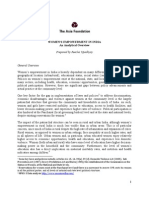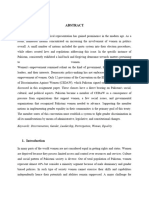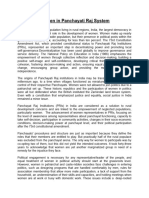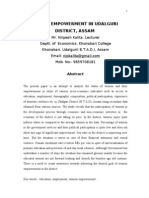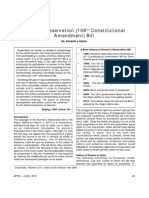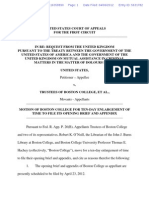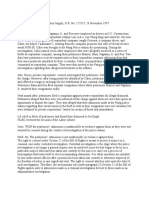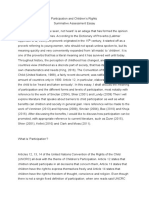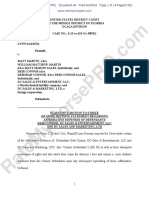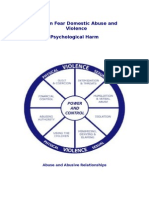Empowerment of India 2
Empowerment of India 2
Uploaded by
sahil manchandaCopyright:
Available Formats
Empowerment of India 2
Empowerment of India 2
Uploaded by
sahil manchandaCopyright
Available Formats
Share this document
Did you find this document useful?
Is this content inappropriate?
Copyright:
Available Formats
Empowerment of India 2
Empowerment of India 2
Uploaded by
sahil manchandaCopyright:
Available Formats
Orissa Review * January - 2006
Empowerment of Indian Women: A Challenge of 21st Century
Dr. Dasarathi Bhuyan
Women s empowerment is a new phrase in the vocabulary of gender literature. The phrase is used in two broad senses i.e. general and specific. In a general sense, it refers to empowering women to be self-dependent by providing them access to all the freedoms and opportunities, which they were denied in the past only because of their being women . In a specific sense, women empowerment refers to enhancing their position in the power structure of the society . The word women empowerment essentially means that the women have the power or capacity to regulate their day- to- day lives in the social, political and economic terms -a power which enables them to move from the periphery to the centre stage. The principle of gender equality is enshrined in the Indian Constitution in its preamble, fundamental rights, fundamental duties and directive principles. The Constitution not only grants equality to women but also empowers the st ate to adopt measures, a position; indiscrimination in favour of women. Within the framework of democratic polity, our laws, developmental policies, plans and programmes are aimed at women s advancement in different spheres. India has also ratified various international conventions to secure rights of women. The women s movement and a widespread network
60
of Non-Government Organisations (NGOs) having strong grass-root presence and deep insight into women s concerns have contributed in inspiring initiatives for the empowerment of women. Women today are trying to understand their position in the society. Women have become increasingly aware of sexual inequalities in every sphere of life and are seeking ways to fight them. The Indian women have cast of their ageold shackles of serfdom and male domination. She has come to her own and started scaling the ladders of social advance with proud and dignity. Women of India are now uplifted and emancipated and granted equal status with men in all walks of life-political, social, domestic and educational. They have a franchise, they are free to join any service or follow any profession. Free India has, besides her woman prime minister, women ambassadors, women cabinet ministers, women legislators, women governors, women scientists, engineers-doctors-space researchers-giant IT specialists, women Generals, women public officers, judiciary officers and in many more responsible positions. No distinction is now made in matters of education between boys and girls. Their voice is now as forceful and important as that of men. They are becoming equal partners in making or dismissing of a government.
Orissa Review * January - 2006
Hindu law has been changed and modified. Far-reaching changes have been introduced in the Hindu Marriage Act. Women have been given right to divorce in certain cases. Besides this, the Hindu Succession Act has given to the daughter; the right to the property of her parents. Our Constitution has given equal rights to women. No distinction has been made on the basis of caste, religion or sex. Their rights have thus been safeguarded. Thirdly, three percent reservation for women is apt to be enacted in the future. Women Empowerment- still an illusion of reality: Not-withstanding the remarkable changes in the position of women in free India, there is still a great divergence between the constitutional position and stark reality of deprivation and degradation. Whatever whiff of emancipation has blown in Indian society, has been inhaled and enjoyed by the urban women, their population belonging to the rural areas are still totally untouched by the wind of changes. They still have been living in miserable conditions, steeped in poverty, ignorance, superstition and slavery. There still exists a wide gulf between the goals enunciated in the Constitution, legislations, policies, plans, programmes and related mechanisms on the one hand and the situational reality on the status of women in India, on the other. The human rights scenario in the country continues to be dismal and depressing. Women are being brutalized, commodified, materialized and subjected to inhuman exploitation and discrimination. Although, gender discrimination has been banned by the Constitution and women have been guaranteed political equality with men, yet there is a difference between the constitutional rights
61
and the rights enjoyed in reality by women. Even after half a century of independence, barring a few exceptions, women have mostly remained outside the domain of power and political authority. Although they constitute about half of the citizen and over the years their participation by way of voting has increased, yet their participation and representation in law making and law implementing bodies are not very satisfactory. No doubt the 73rd and 74th constitutional amendment acts have provided access to women in the decision making process at the grass-root level but their representation in the Parliament and state legislatures is woefully poor. Insecurity does not allow the women leaders to identify leadership at the grass-root level. In politics when a man proposes, they themselves depose. In reality women representatives are ornamental in nature and political consciousness is found lacking among them. They are affected by the caste and class divisions, feudal attitudes, patriarchal nature of the family and village-social, environmental, ethnic, religious separatism and the like. They are members on record only. Allegedly, they are not consulted while taking decision. Thus, women representatives are not free from male dominance in the village administration and no significant change in the power equal is observed in the villages. In these days of scam-ridden politics, the increasing role of money and mafia in elections keeps most of the women away from politics. Increasing violence and vulgarity against them intimates women and consequently they prefer to stay out of politics. What are the reasons for this sorry state of affairs ? Issues may be various and varied, however a few basic issues deserve specific mention :
Orissa Review * January - 2006
Lack of awareness Lack of social and economic empowerment Lack of political will Feebleness of accountability mechanisms Lack of enforcement by the police force Lack of gender culture The question arises, how great er participation of women in politics can be achieved ? Generally, the answer is suggested in the form of 'reservation'. However, mere reservation will not solve the problem unless and until women are given commensurate powers to function effectively and they themselves become more conscious and aware of their rights and duties. More steps to be taken There can not be any dramatic movement in the system just by including women members in Gram Panchayat. At the same time, it is also essential to shed certain stereotyped prevailing notions about role and importance of women in socio-economic development. Women should be encouraged to play a more active part. The male representatives have to establish a rapport with female representatives and give due respect and attention to their views. In the process of development and decision-making women have to operate along with men. Of course, there is some awareness among women due to reservation for them in the Panchayati Raj Institutions (PRIs). But there is need for appropriate training and education relating to different aspects in functioning of Panchayats to make women members conscious enough about their effective role and representation in the Panchayat Samiti. This kind of training can be organized at the district or block level immediately following the election. We have to understand that
62
women representatives can play a vital role in the formulation and implementation of various women and child development programmes. This would increase the efficacy of such programmes. For instance, the women representatives and Gram Panchayat should have sufficient control over the primary education, primary health care and running of the public distribution system. The state must pass and enforce legislation so that the status of women in society is brought to a respectable level through the long arms of the law. In 1985, a separate department of Women and Child Development was set up. In the Sixth Five Year plan, a separate chapter on Women and Development was included. The government had started and implemented major programmes like Support to Training-cumEmployment for Women (STEP), Mahilakosh, Women s Development Corporation, etc. However, legislations and efforts of the state have not made deeper in-roads into the rural and urban areas. For example, sex determination of foetus still continues in all the rural regions of the country despite the enforcement of legislation on Pre-natal Diagnostic Technique (Regulation and Prevention of Misuse) Act, which was passed in 1994. The women of India must o ppose this sex determination of foetus, eve-teasing, bride burning, child marriage, exploitation in the offices, lower wages for labour etc. women from all walks of life must unite and must give priority to their education, growth and the prosperity of their families. Police should accept more female officers and constables so that they are able to deal with the female victims of our society. Female infanticide, female torture, Sati and dowry must be banned in the country. Women must become literate, as education is beneficial for them as well as their families. The family web is woven around the women. She has
Orissa Review * January - 2006
to be up to the mark and educated so that she could fend for herself and her family during the hour of crisis. The status of women would improve only if they educate themselves and grab every opportunity to become stronger and more powerful than before. The discussion brings a major conclusion to light-the status of women could be improved by women themselves and nobody else. It is the modern era of satellites, achievements and technology-based gadget. Why should women be left behind ? There should be a better and fuller understanding of the problems peculiar to woman, to make a solution of those problems possible. As these problems centre round the basic problem of inequality, steps should be taken to promote equality of treatment and full integration of woman in the total development effort of the country. The main stress should be on equal work and elimination of discrimination in employment. One of the basic policy objectives should be universal education of woman, the lack of which tends to perpetuate the unequal status quo. The popular UNESCO slogan should come in handy: educate a man and you educate an individual; educate a woman and you educate a family. Women will have to empower themselves from below in order to compel the government to empower them from above . Further, there is
a need for a change of values and behaviour in the society, a need for positive socio-cultural and economic empowerment and above all the will power and strong determination of women to join politics. Education can play a vital role in bringing about the desirable behavioural changes among the women and make them well equipped in terms of knowledge, competence and capacity to deal with different political problems. It may be concluded that women have shifted traditional assumptions about their roles and capabilities. There has been a marked change, and it has been for the better. Many of its benefits however have yet to touch the majority and all of us continue to experience various forms of gender discrimination. If laws designed to address the concerns of women are to have a dramatic and positive impact on women s lives, they must be sensitive to the social, economic and political disempowerment of women throughout the world. The most important measure of their success should be the extent to which they enable woman to interpret, apply and enforce laws of their own making, incorporating their own voices, values and concerns.
Dr. Dasarathi Bhuyan is a Lecturer in Political Science, at Bellaguntha Science College in the District of Ganjam.
63
You might also like
- 5 Steps To A Happy MarriageDocument142 pages5 Steps To A Happy MarriageJonnathan Lafuente MedinaNo ratings yet
- Women EmpowermentDocument10 pagesWomen EmpowermentLekshmi Manu100% (5)
- Calica Book 1 AufDocument139 pagesCalica Book 1 AufJohan FranciscoNo ratings yet
- Contract B NotesDocument8 pagesContract B Notesg12m5765No ratings yet
- Women Empowerment in IndiaDocument12 pagesWomen Empowerment in IndiaVikas SawhneyNo ratings yet
- Women in IndiaDocument5 pagesWomen in Indiaward fiveNo ratings yet
- Women in PakistanDocument7 pagesWomen in PakistanSyed Zulqarnain100% (3)
- Women EmpowermentDocument7 pagesWomen EmpowermentsubinasyalNo ratings yet
- Gender Inequality and Women Participation in Indian PoliticsDocument3 pagesGender Inequality and Women Participation in Indian PoliticsNish JohnNo ratings yet
- Women Empowerment in IndiaDocument4 pagesWomen Empowerment in IndiaNat RajaNo ratings yet
- Women Empowerment in IndiaDocument6 pagesWomen Empowerment in IndiaDheeraj SonkhlaNo ratings yet
- Women EmpowermentDocument7 pagesWomen EmpowermentMUKUL DHIRANNo ratings yet
- Intro and ConclusionDocument12 pagesIntro and Conclusionrita dasNo ratings yet
- Women EmpowermentDocument10 pagesWomen Empowermentsarmadhritiraj000No ratings yet
- Women Empowerment - Through Panchayat Raj System - Law Times Journal PDFDocument6 pagesWomen Empowerment - Through Panchayat Raj System - Law Times Journal PDFShivaraj ItagiNo ratings yet
- Women". Women, The Noblest Creation of God, Has Been Gifted With Compassion, TenderDocument4 pagesWomen". Women, The Noblest Creation of God, Has Been Gifted With Compassion, TenderGirijesh PandeyNo ratings yet
- WOmen Empowerment PaperDocument10 pagesWOmen Empowerment PaperPIYUSH SHARMANo ratings yet
- Women in PoliticsDocument3 pagesWomen in PoliticsKelvin MaxNo ratings yet
- Women EmpowermentDocument37 pagesWomen EmpowermentKirat Brar100% (2)
- Prepared by Reecha Upadhyay: Women'S Empowerment in India An Analytical OverviewDocument14 pagesPrepared by Reecha Upadhyay: Women'S Empowerment in India An Analytical Overviewkailash_narainNo ratings yet
- 5 Dr. Neelam UpadhyayaDocument6 pages5 Dr. Neelam UpadhyayaRavi ModiNo ratings yet
- Life Skills For Women's EmpowermentDocument38 pagesLife Skills For Women's Empowermentsjo0583% (12)
- Socio-Economic Empowerment of Women and Gender Participation in GovernanceDocument13 pagesSocio-Economic Empowerment of Women and Gender Participation in GovernanceUsman BaitanaiNo ratings yet
- EBC-Women Empowerment 2Document10 pagesEBC-Women Empowerment 2dbibek359No ratings yet
- Women EmpowermentDocument10 pagesWomen Empowermentvangaripriyanka7No ratings yet
- The Participation of Women in Politics in IndiaDocument11 pagesThe Participation of Women in Politics in Indiayashasvi mujaldeNo ratings yet
- Women EmpowermentDocument2 pagesWomen EmpowermentSamratNo ratings yet
- KARTIK PATIL SIMMC-A RESEARCH PAPER ON Study On Empowering Women in IndiaDocument11 pagesKARTIK PATIL SIMMC-A RESEARCH PAPER ON Study On Empowering Women in IndiaKartik PatilNo ratings yet
- EmpowermentDocument8 pagesEmpowermentAnalip Kashyap【A】【K】No ratings yet
- Political Science Assignment 1Document8 pagesPolitical Science Assignment 1PrakruthiNo ratings yet
- Women EmpowermentDocument5 pagesWomen EmpowermentHansiNo ratings yet
- Women Empowerment: Remyachandran NSS Training College PandalamDocument6 pagesWomen Empowerment: Remyachandran NSS Training College Pandalamremya chandranNo ratings yet
- Women'S Political Inclusion Through Pris and Good GovernanceDocument7 pagesWomen'S Political Inclusion Through Pris and Good GovernanceavnishNo ratings yet
- Women Empowerment: Source To Economical DevelopmentDocument3 pagesWomen Empowerment: Source To Economical Developmentinventionjournals100% (1)
- SwarnaDocument7 pagesSwarnaRaparthi DigvijaysaiNo ratings yet
- Women Empowerment in IndiaDocument2 pagesWomen Empowerment in IndiaPradipta RudraNo ratings yet
- Gender Equality Still A Dream in India PDFDocument10 pagesGender Equality Still A Dream in India PDFJaskirat SinghNo ratings yet
- Women's Empowerment Is The Process in Which Women Elaborate andDocument18 pagesWomen's Empowerment Is The Process in Which Women Elaborate andNavin Sachdev100% (1)
- Women Empowerment in IndiaDocument3 pagesWomen Empowerment in IndiaPalak RawatNo ratings yet
- Women Empowerment PDFDocument3 pagesWomen Empowerment PDFDevansh ShuklaNo ratings yet
- Women EmpowermentDocument57 pagesWomen Empowermentyash sharmaNo ratings yet
- DocumentDocument5 pagesDocumentVaibhav VermaNo ratings yet
- StatusofWomeninPost Paper4Document15 pagesStatusofWomeninPost Paper4Fiza RasulNo ratings yet
- HR AssigmentDocument10 pagesHR AssigmentArshia FatimaNo ratings yet
- Women in Panchayat Raj SystemDocument2 pagesWomen in Panchayat Raj Systemadrish22No ratings yet
- Gender and Politics in Third World Country.......Document4 pagesGender and Politics in Third World Country.......shaheena.p999No ratings yet
- 13 Chapter 8Document15 pages13 Chapter 8Devesh SharmaNo ratings yet
- Women Empowerment Pragna DiDocument13 pagesWomen Empowerment Pragna Dirungta.pieeNo ratings yet
- Women EmpowermentDocument52 pagesWomen EmpowermentAbhishek SaravananNo ratings yet
- Women's Rights in India: Dr. Radhika KapurDocument15 pagesWomen's Rights in India: Dr. Radhika KapurNisha MusaddiNo ratings yet
- Women and Politics in IndiaDocument9 pagesWomen and Politics in Indiasuryansh099-21No ratings yet
- Essay - The Empowerment of Women in IndiaDocument5 pagesEssay - The Empowerment of Women in Indiashahrachit91No ratings yet
- Unit 5Document11 pagesUnit 5Samipta SinghNo ratings yet
- Wiis Assignment1Document24 pagesWiis Assignment1sanjeevani rawatNo ratings yet
- Changing Status of Women in The SocietyDocument16 pagesChanging Status of Women in The SocietyVibhuti SharmaNo ratings yet
- Women Empowerment and Government'S Steps: Ndependence BstaclesDocument9 pagesWomen Empowerment and Government'S Steps: Ndependence BstaclesKazi Md. Nahid HossainNo ratings yet
- Women Emp Seminar N. KalitaDocument12 pagesWomen Emp Seminar N. KalitaNip KalitaNo ratings yet
- Gender Equity Woman Empowerment AbstractDocument7 pagesGender Equity Woman Empowerment AbstractAvijitneetika MehtaNo ratings yet
- Empowerment of Rural Scheduled Caste Women of Meerut District in Western (U.P) An Educational and Occupational PerspectiveDocument11 pagesEmpowerment of Rural Scheduled Caste Women of Meerut District in Western (U.P) An Educational and Occupational PerspectivearcherselevatorsNo ratings yet
- Women's Reservation (108th Constitutional Amendment) BillDocument9 pagesWomen's Reservation (108th Constitutional Amendment) BillRakesh Singh100% (1)
- The Power of She: Encouraging Women to Embrace Their StrengthsFrom EverandThe Power of She: Encouraging Women to Embrace Their StrengthsNo ratings yet
- Rule 124 - Procedure in The Court of AppealsDocument7 pagesRule 124 - Procedure in The Court of Appealsanjonesss aypssNo ratings yet
- How About SeptemberDocument3 pagesHow About SeptemberchrisabrayNo ratings yet
- Corinthians V Spouses TanjangcoDocument3 pagesCorinthians V Spouses TanjangcoDiane VirtucioNo ratings yet
- Avelino v. CaDocument4 pagesAvelino v. CaJie JessNo ratings yet
- Manuel V,. NC ConstructionDocument2 pagesManuel V,. NC ConstructionJhomel Delos Reyes100% (1)
- Performance PNPDocument88 pagesPerformance PNPTherese ElleNo ratings yet
- 2ndquarter Lesson 1part 2 ChoicesDocument20 pages2ndquarter Lesson 1part 2 ChoicesJaira Mae Alyssa CortezNo ratings yet
- COMPILATION BAR QUESTIONS WEEKS 16, 17, & 18 - EXECUTIVE CLASS FINAL For PrintDocument123 pagesCOMPILATION BAR QUESTIONS WEEKS 16, 17, & 18 - EXECUTIVE CLASS FINAL For PrintEdeline Cosicol0% (1)
- Aurelio V AurelioDocument2 pagesAurelio V AurelioRam Adrias100% (1)
- What Women SHLD Know VAW PDFDocument2 pagesWhat Women SHLD Know VAW PDFJaymar Donozo100% (1)
- Copyright InfringementDocument2 pagesCopyright InfringementKevyn VzNo ratings yet
- Cir vs. B.F. Goodrich Phils., Inc.Document3 pagesCir vs. B.F. Goodrich Phils., Inc.Marky RamoneNo ratings yet
- Heirs of Pangan Vs PerrerasDocument4 pagesHeirs of Pangan Vs PerrerasCovidiaNo ratings yet
- CV Leong WaiKumDocument9 pagesCV Leong WaiKumclement3176No ratings yet
- BDO Unibank Vs Sps LocsinDocument8 pagesBDO Unibank Vs Sps LocsinAlvin HalconNo ratings yet
- Cases of Supreme CourtDocument9 pagesCases of Supreme Courtউ ৎ সবNo ratings yet
- Ramiscal v. OrroDocument1 pageRamiscal v. Orroangelo prietoNo ratings yet
- Eduardo G. Ricarze vs. CA and People of The Philippines, Caltex PH, Inc. and PCI BankDocument2 pagesEduardo G. Ricarze vs. CA and People of The Philippines, Caltex PH, Inc. and PCI BankTricia SibalNo ratings yet
- Participation and Children's Rights Summative Assessment EssayDocument13 pagesParticipation and Children's Rights Summative Assessment EssayClaudine SlaterNo ratings yet
- Freedom of Speech and ExpressionDocument23 pagesFreedom of Speech and ExpressionvarunNo ratings yet
- Motion To Strike Affirmative Defenses or More Definite StatementDocument14 pagesMotion To Strike Affirmative Defenses or More Definite StatementRf Goodie100% (1)
- As 4121-1994 Code of Ethics and Procedures For The Selection of ConsultantsDocument8 pagesAs 4121-1994 Code of Ethics and Procedures For The Selection of ConsultantsSAI Global - APACNo ratings yet
- British ParliamentDocument4 pagesBritish ParliamentДенис МатеишенNo ratings yet
- Domestic Violence and Abuse:Living in Fear Domestic Abuse and ViolenceDocument11 pagesDomestic Violence and Abuse:Living in Fear Domestic Abuse and ViolenceJorge Yeshayahu Gonzales-Lara100% (2)
- Rule 17 - DismissalDocument6 pagesRule 17 - DismissalJereca Ubando JubaNo ratings yet
- 01 - Cir vs. RufinoDocument5 pages01 - Cir vs. RufinoChristineNo ratings yet
- GR No. 191590Document3 pagesGR No. 191590.100% (1)



















